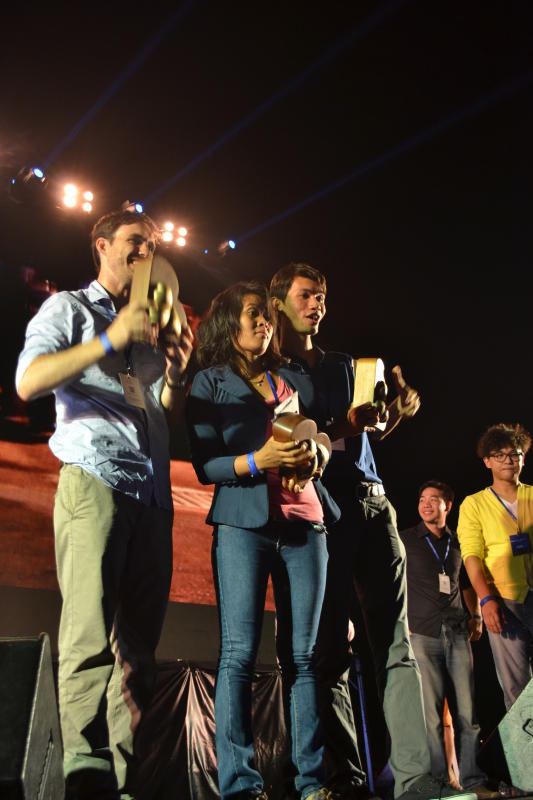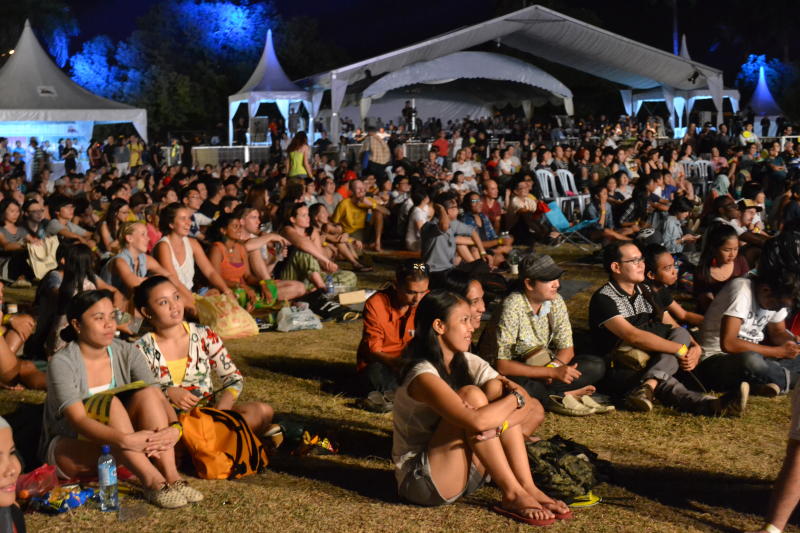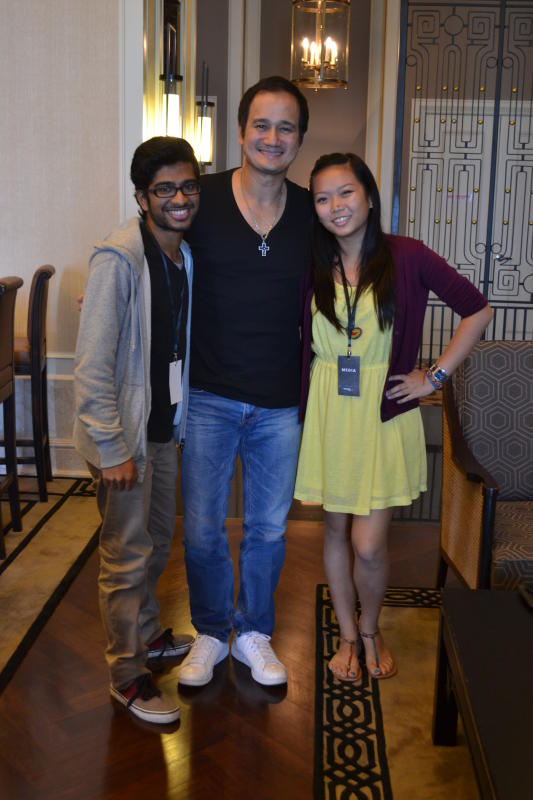By AMANDA NG and SATHESH RAJ
Photos by AMANDA NG and MARCHELLA PININTA
brats@thestar.com.my
WHAT do you get when you put a Hollywood director, an Academy Award winner and young South East Asian filmmakers together? A whole lot of mind-blowing inspiration, of course!
Tropfest South East Asia (SEA) landed on the region’s shores for the very first time with a week-long festival held in George Town, Penang. The annual celebration of short films has its roots in Sydney, Australia, 20 years ago, when more than 200 people squeezed into a café for an informal screening.
Now, Tropfest Australia attracts an audience of over 150,000 in a single night, and has expanded to other countries including the United States and New Zealand.
Closer to home, Tropfest SEA saw a crowd of more than 4,000 sprawled out on the grass at the Esplanade in Penang, enjoying music, good food and the 12 finalists’ short films under the stars.
As BRATs, we were ecstatic to be able to experience Tropfest SEA in a fuller dimension – from attending the Roughcut Symposium, to interviewing the “big shots” one-on-one and attending the festival night itself.
Inspiration overload
To speaker Jason Van Genderen, short films are “creative therapy you can share”. The Tropfest New York 2008 winner uses filmmaking to make sense of the world around him.
“It’s my way of projecting the way I’m figuring things out, and mirroring it to an audience,” he said.
Van Genderen’s winning entry, Mankind is No Island, is a poetic take on urban homelessness. It was shot entirely on a mobile phone, proving that filmmaking is not always about expensive equipment or fancy effects.
“A story needs to surprise you,” he said, explaining that half the battle for people is understanding that they cannot always predict where their next story comes from.
“Be a story catcher. Identify and hold it – it’s about what you do in that moment that makes a difference.”
Academy Award winner and Tropfest SEA judge Adam Elliot expressed similar sentiments, kicking off the Roughcut Symposium by sharing his journey towards the Oscars.
Before the nomination, the Australian stop-motion animator had A$88 (RM260) in the bank and was relying on government aid to survive.
Elliot spent over 15 months completing the winning short film, Harvie Krumpet. He worked out of a tiny room in his father’s storage facility, with no air-conditioning, and no access to a toilet after 5pm. The solution? A bucket.
“What we knew we had was a good story. And that’s what it’s all about,” he said. “It’s not about the money or the fame; it’s about being a good storyteller.”
Ten years after winning the Oscar, Elliot continues to do what he is passionate about – telling stories via good old-fashioned clay stop-motion animation – and remains connected to the obstacles young filmmakers face.
To him, events like Tropfest SEA allow filmmakers to hear each others’ “war stories” or challenges.
“We all have so much in common – feeling alone, going through periods of self-doubt, feeling like ‘I’m a fraud, I’m no good, I have no talent …’” said the quirky Elliot, who looks like one of his own clay figurines come to life.
“It’s early days for Malaysia, but you already have fantastic filmmakers and getting to meet some of them yesterday for me was a real honour,” he added.

The three winners of the Tropfest SEA 2014 short film competition, (from left) Ezequial Paolinelli from Malaysia, Sothea Ines from Cambodia and Polen LY from Cambodia.
Closer to home
The Roughtcut Symposium brought to light the bigger challenges South East Asian filmmakers face behind the scenes – a lack of government support and funding, censorship issues, a local preference for Western films and more.
However, obstacles also abound for those in front of the camera, as speaker Gurmit Singh (aka Phua Chu Kang) attested to.
The Singaporean actor highlighted the realities of the “volatile” film industry.
“I think a lot of young people have this misconception that when you start out, it’s just an audition. Then if you’re selected, you go to parties, get free clothes and cars.
“Like anything else, you have to put in hard work, put your back into it,” explained the MediaCorp artiste who started out as a dancer and actor in small-scale productions.
In his 20th year on TV, he admits that it’s been “very difficult”.
“There are good days and bad days,” he said. “I have missed important dates – like when my daughter crawled for the first time.”
However, Gurmit keeps going, out of his love of “creating something” – that sense of achievement when you can say, “This is mine. I’ve done this.”

Movie madness: Over 4,000 people turned up for the first-ever Tropfest South East Asia event, held in George Town, Penang.
Reel-ly awesome stuff
Perhaps that was the same feeling of accomplishment the 12 Tropfest SEA short film competition finalists experienced when their films were selected out of the 184 entries from nine countries.
Using the “Tropfest Signature Item” of “RICE”, the filmmakers had to incorporate the region’s staple food in their short films.
The panel of judges consisted of Elliot, Legally Blonde director Robert Luketic, Singaporean director Glen Goei, Malaysian actress Sharifah Amani, and Hong Kong International Film Festival director Roger Garcia. We definitely were blown away by the different interpretations of “RICE” – from whimsical coloured rice that come to life, to a sensitive take on abortion for Muslims, to using food to make music!
The 12 finalists had varying levels of experience with filmmaking (for some, it was their very first short film), but they had all come a long way to be at Tropfest SEA in Penang.
For Cambodian filmmaker Mony Kann Darung, 23, the experience was “unbelievable”.
“A few days ago, I was a nobody, and now, I am meeting Hollywood directors,” said the assistant TV show producer. “When I got back to the hotel, I was like, ‘oh my god, how did this happen?’”
Perhaps the journey was even more surreal to Thai filmmaker Supawit Buaket, who became a finalist in an international festival at 19.
He may still be in high school, but there was a certain sense of maturity as he described the challenges he and his team went through to produce their short film.
“After shooting 50% of the film, our nine-year-old actress died in an accident. It was really sad, and we had to change the script,” he said.
But despite all the amazing entries, the judges’ decision was unanimous. First-time filmmaker Sothea Ines, 24, from Cambodia, clinched the top prize for her film, Rice.
Set during the Khmer Rouge period, the short revolved around five orphans at a Communist children’s camp, who secretly collected grains of rice to stave off starvation, but were eventually caught and punished.
The silent film was shot entirely in monochrome, but it managed to keep the audience engaged throughout the seven minutes – addressing a monumental part of Cambodia’s history through one small incident.
As a scriptwriter by day, Ines said her main challenge was constructing a realistic set of 1975, with costumes and locations, to re-enact the Khmer Rouge killing spree.
Working with children who weren’t professional actors was another huge challenge.
“I almost wanted to resign,” she added with a laugh.
Ines was in tears of joy at the end of the night, looking overwhelmed by the unexpected win.
“It’s just so incredible to be here. I made it. With the prize, I will go back to my kids (who acted in the film) and tell them, they’re the winners of Tropfest!” she exclaimed.
Ines walked away with US$10,000 (RM33,500), and a five-day immersion trip to Los Angeles. We’re pretty sure she’s glad she didn’t resign after all.
The brains behind the festival
According to Gurmit, if Phua Chu Kang were at Tropfest, he’d probably say: “Don’t like lah, so short. Come here all the way, the film is shorter than my flight.”
However, the short film festival is serious business to Tropfest SEA Managing Director Joe Sidek.
When asked if there’s a recipe to putting together something as epic as Tropfest SEA, his reply was simple: Courage and passion.
At Tropfest Sydney, Sidek saw for himself films being watched by hundreds of thousands of people, and thought, “Wow. So this is what filmmaking is all about.”
There, big names like Nicole Kidman, Cate Blanchett and Geoffrey Rush attended Tropfest. And this time round in South East Asia, so did international and local figures. None of the speakers were paid.
“It’s not just about films. It’s about sharing journeys, and inspiring people to continue their journey,” said Sidek.

BRATs reporters Satesh Raj (left) and Amanda Ng (right) catching up with Gurmit Singh from Phua Chu Kang. He was one of the many excellent speakers at Tropfest SEA.
Stories of storytellers
At the heart of it all, Tropfest SEA was about filmmakers and their stories.
The road has been a long one for many of the personalities at the festival, including Elliot, who was more than happy to share his wisdom.
If he could rewind back to 1996 and meet himself when he was in film school, he would tell himself to “stop being so worried about everything”, and just focus on the work – one script at a time, one film at a time.
“When you’re young, you worry about what your peers and family think, but as you get older, you start becoming more comfortable in your own skin and in your own self,” he explained. With “Harvie Krumpet” Elliot claimed that he didn’t know what he was doing, but worked from intuition and instinct. And it worked! Even now, he tries to keep it simple and not obsess too much about the audience, purpose or genre. “Sometimes I say I make my films for my parents, I just want my parents to like them,” he said.
On a larger scale, young South East Asian filmmakers may also be concerned with the perceived limitations of the industry in our region.
To help address those concerns, the festival gathered voices from all over the industry who shared insights and offered answers to pressing questions. Gurmit, for one, remains optimistic, believing that the industry is beginning to grow now, getting attention from the Western world. “In the past, we wanted to go there (the West), so that we could be a part of what’s going on there; but in the past 10 years, things have really changed,” he said. “We South East Asians know that we can do our own thing, in our own way, and show the world what our culture is.”
Van Genderen said: “Tropfest’s role here in South East Asia is to help preserve and foster local stories and storytelling culture, and give it a home and a base. That is the real potential.”
Through his years of experience honing his craft, Van Genderen believes that failing is inevitable, but success is also inevitable as long as you don’t stop trying.
His advice to aspiring filmmakers is to trust their instincts and never stop looking for stories, because everybody has a story.
“You need to be brave, adventurous, and believe that you can tell a story and not give up,” he said.
Want to watch the 12 Tropfest SEA finalists’ short films? They’re all available at www.viddsee.com/tropfestsea.



Tell us what you think!